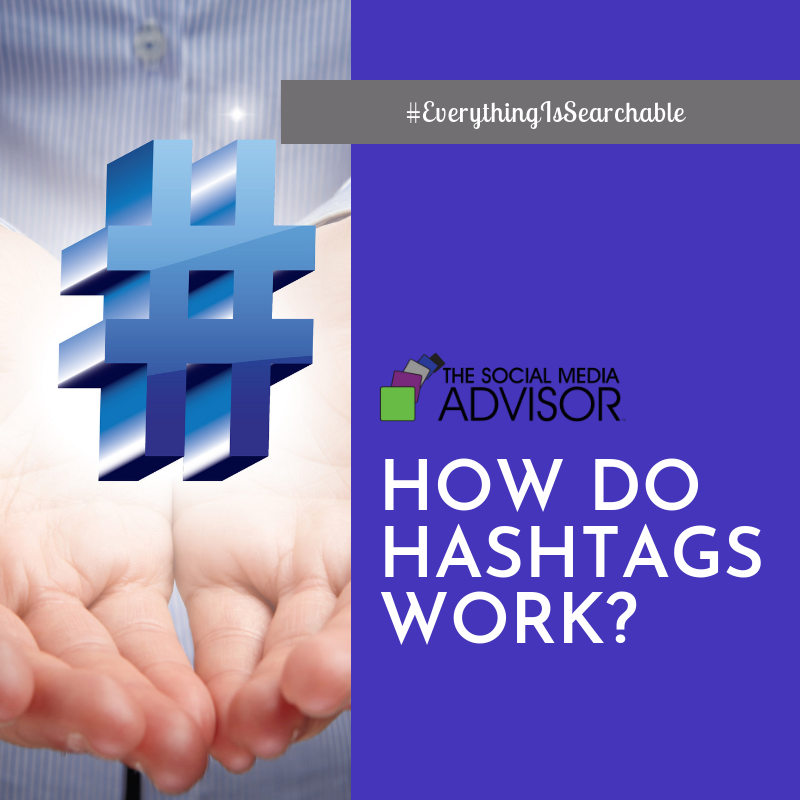
#EverythingIsSearchable – How Do Hashtags Work?
If you’re trying to understand hashtags and how best to incorporate them into your social media profiles and posts, try thinking of them as searchable tags or labels. The purpose is to identify the topic so that others who have an interest in the subject can find it. When it comes down to it, hashtags are really just carefully selected words with a pound sign (#) in from of them. They are added to content in order to make it searchable.
History of Hashtags
The use of hashtags started on Twitter where it was seen as a way to group related content to facilitate a search. The use quickly spread to Instagram, Facebook, and Pinterest and they are used in many creative ways. Today, hashtags are widely used to make it easier to find specific information and provide people with a way to find content that is related to a specific topic.
Hashtags in Business
Even though the concept of the hashtag is really pretty simple, when applied strategically they can be pretty darned powerful. There are many great examples of how companies have parlayed hashtags into big marketing wins (#likeagirl, #shareacoke). #Shareacoke, for example, is used as part of a large Coca Cola campaign. Its purpose is to encourage customers to use the hashtag when uploading photos of a bottle with someone’s name.
While you may not have the resources available that Coca Cola does, you can still use hashtags as part of your marketing strategy. When using them, you can create your own or use an already established tag that is topical or trendy.
Why Businesses / People Use Hashtags
The original purpose of the hashtag was to group online conversations together to make updates related to a specific topic easier to find. This is still, fundamentally, why we use hashtags today. Since each social media profile is its own search engine, hashtags are powerful tools for searching for information and for grouping similar posts together. While there are folks that use hashtags for entertainment purposes, when using hashtags for your business – the point is to show up in certain search feeds to increase your online visibility and the chance that users will stumble onto your online content more often.
How to Use Hashtags
Like keywords, you first need to do some research to uncover which hashtags work for your brand. What are other people in your industry or area using? What comes up when you do a hashtag search and is that a search your brand is comfortable showing up in? How many people are already using, and searching, using that hashtag?
- Businesses use hashtags to show up in general keyword searches such as #skincare for beauty professionals or #marketing for marketing companies.
- Companies that host events will create a custom hashtag to group all the posts about that event together and make it easier to find.
- A business owner could also create custom hashtags or their own brand to group their online content together and make it all easier to locate in one search.
You’ll want to make a list of appropriate hashtags for your business so you can recall them quickly when drafting your social media content.
When you create your own hashtags, you want to make sure to include them across a variety of messages and use them consistently. Ideally, the hashtag should be easy to remember and relate to your branding.
Creating effective tags can be harder than it looks. Luckily there are experts you can call on for help. If you’re interested in incorporating hashtags into your campaigns, now is the perfect time to talk with The Social Media Advisor. Right now you can take advantage of our comprehensive social media revamp and management packages that are designed to get you found and noticed on social media.
Be sure to Follow us and Let’s Engage!
Hollie Clere of The Social Media Advisor is a “#BeAwesome” Developer, Social Media, Brand Builder, Content Manager, Trainer and Author in LinkedIn, Facebook, Twitter, Blog, Google+, YouTube, Pinterest, Instagram, and the tools to manage them.
Click here for Social Media Training, Speaking and Strategy Consultations.



